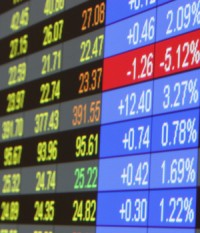Asian shares follow Wall Street lower
 Asian stocks tumbled on Thursday as investors reacted to a worsening Covid-19 health crisis and a downbeat economic outlook from the Federal Reserve.
Asian stocks tumbled on Thursday as investors reacted to a worsening Covid-19 health crisis and a downbeat economic outlook from the Federal Reserve.
Amid rising virus cases and vaccine delays, Federal Reserve officials flagged a worrying slowdown in the pace of the economic recovery overnight.
China’s Shanghai Composite index dropped 68.17 points, or 1.91 percent, to 3,505.18 amid lingering worries over policy tightening. Hong Kong’s Hang Seng index ended down 2.55 per cent at 28,550.77.
Japanese shares ended sharply lower as tech stocks succumbed to heavy selling pressure after recent strong gains.
The Nikkei average fell 437.79 points, or 1.53 percent, to 28,197.42, while the broader Topix index closed 1.14 per cent lower at 1,838.85.Chip-related shares were among the worst hit, with Renesas Electronics losing 5.9 percent and Advantest falling 4.3 per cent.
Media and internet advertising company CyberAgent plunged as much as 9.2 per cent. Fanuc shed 1 per cent despite the robotics company raising its operating profit forecast for a second time.
Heavyweight SoftBank Group ended 3.6 per cent lower. Nissan Motor gained 1.8 per cent after the automaker said all of its new vehicles in key markets such as Japan, China, the US and Europe will be partly or fully electrified by the early 2030s.
In economic news, a government report showed the value of retail sales in Japan fell an annual 0.3 per cent in December. That beat expectations for a decline of 0.4 per cent following the downwardly revised 0.6 percent increase in November.
Australian markets ended deep in the red after the Federal Reserve flagged a potential slowdown in economic recovery. The benchmark index fell as much as 2.4 per cent in its worst session since September 9 before recouping some of its loss to end the session down 130.90 points, or 1.93 per cent, at 6,649.70.
The broader All Ordinaries index fell 142.60 points, or 2.02 per cent, to 6,917.60. Iron ore miner Fortescue Metals Group slumped 4 per cent after filing its December 2020 quarterly production report. Heavyweights BHP and Rio Tinto fell 1.7 per cent and 2.9 per cent, respectively.
Gold miner Newcrest Mining shed 2.8 per cent as it reported a drop in gold production from the same quarter last year due to lower output from its Cadia and Lihir mines.
The big four banks fell between 0.9 per cent and 1.7 per cent. Tech stocks fell heavily, with Afterpay giving up 6.2 per cent. In the energy sector, Woodside Petroleum and Santos declined around 2 per cent while Oil Search plummeted 3.9 per cent.
Seoul stocks fell sharply amid massive selling by foreign investors. The benchmark Kospi dropped 53.51 points, or 1.71 per cent, to 3,069.05 after the Fed didn’t announce new measures to quicken the economic recovery.
Samsung Electronics lost 2.2 per cent despite the company forecasting solid demand for its chips in the current quarter. No. 2 chipmaker SK Hynix slumped 4.3 per cent.
In economic news, business sentiment in South Korea ticked higher in January, the latest survey from the Bank of Korea said with an index score of 85.0 – up from 82.0 in December.
New Zealand shares tumbled amid deepening concerns about stretched valuations in equities markets. The benchmark NZX-50 index ended down 287.54 points, or 2.15 per cent, at 13,086.46, dragged down by financials and utilities.
Following a probe into multiple outages and cyberattacks that hit stock exchange operator NZX last year, the FMA (Financial Markets Authority) has found the bourse’s systems were “insufficient” and failed to meet standards.
New Zealand posted a merchandise trade surplus of 17 million New Zealand dollars in December, Statistics New Zealand said today – following the 252 million New Zealand dollar surplus in November.
Exports dropped 2.7 per cent year-on-year while dairy exports fell 19 percent.
US stocks suffered their biggest single-day percentage drop in three months on Wednesday, with concerns about the impact of new, more contagious coronavirus strains, vaccine delays and stimulus uncertainty weighing on markets.
There was some disappointment as the Federal Reserve didn’t provide additional about the outlook for its bond purchases. The Dow Jones Industrial Average lost about 2.1 per cent, while the tech-heavy Nasdaq Composite index and the S&P 500 gave up around 2.6 per cent each.
Source: GNA
